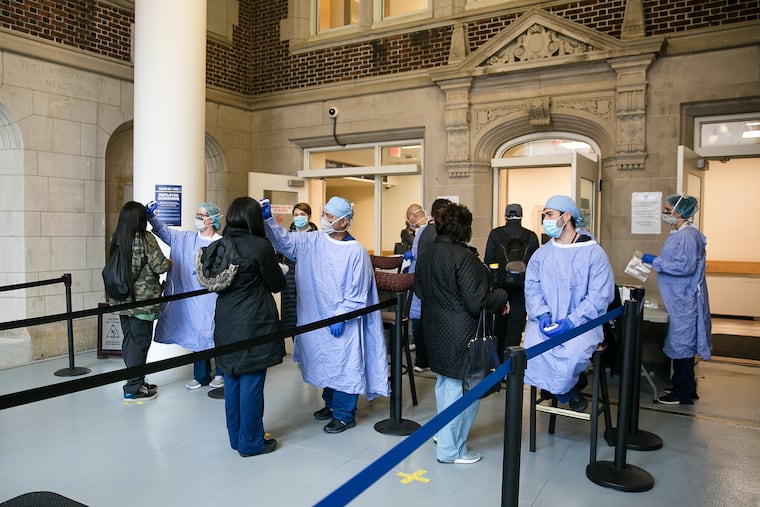Pregnant women need doctors, but want to avoid coronavirus. Penn is using robots to keep them home more.
Penn is distributing blood-pressure cuffs to pregnant women so they can monitor their own BP, potentially eliminating three in-person trips to the hospital or doctor prior to delivery.

The coronavirus crisis has had a special and profound impact on women who are pregnant or have recently given birth. Anxiety abounds that they or their newborn will contract the virus. Some are fleeing hot spots such as New York to seek care elsewhere. And most women in labor can have just one person with them, if that.
Much of the fear comes from the need to be in hospitals or doctors’ offices for prenatal care — checkups, ultrasounds, blood-pressure monitoring — as well as for delivery and those critical first few days after the infant is born, while both baby and mother are typically confined to the hospital.
The science isn’t yet certain on whether mothers who contract COVID-19 can pass it to a fetus. And hospitals are taking steps to keep COVID-19 patients isolated, especially from other at-risk patients such as pregnant women, and expanding telemedicine and remote-care capabilities.
But there’s more to be done to help pregnant women maintain social distancing, and physicians at the Hospital of the University of Pennsylvania are now fast-tracking high-tech solutions that aim to keep them away from the hospital as much as possible before delivery, and to get them out of the medical center sooner after birth.
One new program distributes blood-pressure cuffs — so pregnant women can monitor their own blood pressure and report it to their doctors, potentially eliminating three appointments. Another is a postpartum check-in system that aims to get women out of the hospital a day earlier by using a chatbot to answer questions about everything from umbilical cords to breastfeeding.
The physicians rolling out the programs say every minute in the hospital matters. Anna Graseck, who is overseeing the cuff-distribution program, said Thursday that she saw three new pregnant patients, and all told her it was the first time they had left the house in more than a month.
“Pregnant patients are taking social distancing extremely seriously, as they should,” said Graseck, an assistant professor of clinical obstetrics and gynecology. “When people are rationing their groceries over three weeks, that one trip matters.”
» READ MORE: Philadelphia-area stores with dedicated hours for seniors, pregnant women and the immunocompromised
In the prenatal phase, Penn obstetricians last week began distributing blood-pressure monitoring cuffs to women who are pregnant. Doctors prompt patients via text to check their blood pressure at home, then the women read the monitor — which interprets the reading, so no counting — and report it to the doctors for monitoring. The process is used in conjunction with counseling via phone.
Blood-pressure monitoring is a critical component of prenatal care, particularly in the third trimester, Graseck said, as elevated blood pressure is “incredibly common” but a leading cause of pregnancy-related death if left untreated.
Routine prenatal care is anywhere from nine to 12 visits over the course of a pregnancy, Graseck said, and lowest-risk patients who use the cuff at home could require just six to nine trips, largely for lab testing and ultrasounds that can’t be done remotely.
HUP delivers about 4,000 babies a year, so Penn could “easily” enroll 1,000 pregnant women in the cuff-distribution program over the next several months, Graseck said. The equipment is covered by insurers, including some Medicaid payers that “have really stepped up,” she added.
As for postpartum care, Penn has accelerated and expanded the rollout of its “Healing at Home” program, which was launched in 2017 with the goal of getting new mothers out of the hospital as soon as possible.
The program, piloted last year, involves using augmented intelligence, whereby a new mother and her infant can be discharged early, and mom is set up to communicate with a robot by text that can counsel her on frequently asked questions, said Kirsten Leitner, an assistant professor of clinical obstetrics and gynecology who oversees the program.
» READ MORE: Fleeing coronavirus in NYC, pregnant women head to Philly area but struggle to find prenatal care
It’s not all communication with the chatbot (whose name is Penny, after Penn, of course). Leitner said the questions and answers are monitored by providers, and any question that isn’t answered with a programmatic response is answered by a clinician, who typically responds within 30 to 60 minutes, far sooner than the full business day it can take to get a phone call back from a physician.
In addition to answering such questions as “When should the umbilical cord fall off?” and “Is this rash normal?,” providers are also offering lactation counseling and postpartum depression screening, all via text.
The early-discharge program can reduce post-delivery time in the hospital from, on average, about two days to just over one day. It’s available for mothers who delivered vaginally — women who have cesarean sections have different questions that haven’t been programmed in yet — and had little to no complications.
The programs will also be used post-pandemic to help Penn tailor care to women who are pregnant.
Leitner said much of the value for the new mothers, especially during a pandemic, is just in knowing help is a text away.
“Call volumes to our office are up,” she said. “To know there is something established they can be grounded in is a huge benefit to this program.”